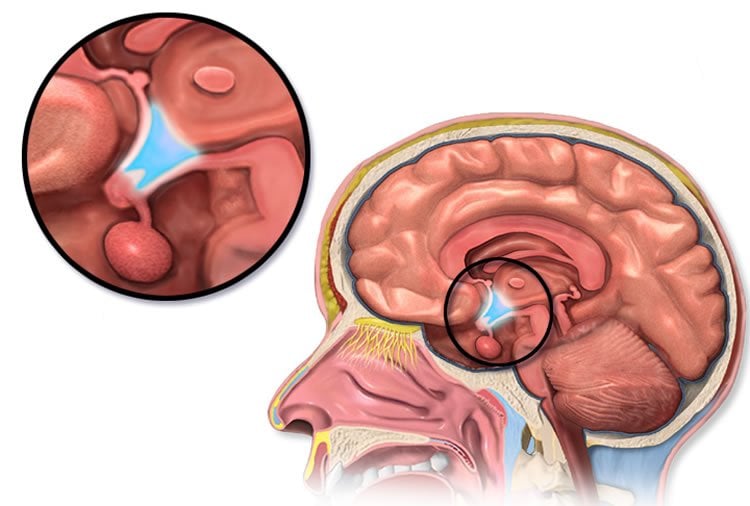Summary: A new study opens the door for new treatments to help treat obesity and other eating disorders.
Source: Baylor College of Medicine.
A small group of brain cells moderates whether an individual is hungry or full. In mouse studies, when these cells are impaired, the animal eats constantly and becomes obese. On the other hand, when the cells enhance their activity, the mice eat little and lose weight. The study, published today in Nature by researchers from Baylor College of Medicine, Texas Children’s Hospital and the University of Texas Health Science Center in Houston, opens the possibility of developing drugs to help treat obesity, a major health problem around the world, as well as other eating disorders.
“How the brain controls appetite has been mostly focused on the hypothalamus,” said senior author Dr. Benjamin Arenkiel, an associate professor of molecular and human genetics and of neuroscience at Baylor. The hypothalamus is a brain region involved in a variety of bodily functions, such as temperature regulation, control of food and water intake, sexual behavior and reproduction and mediation of emotional responses.
“In addition, acetylcholine, a modulator of brain activity, has been proposed to play a role in appetite control, but this role had not been explored until now,” said Arenkiel, who is also a McNair Scholar at Baylor and an investigator at the Jan and Dan Duncan Neurological Research Institute at Texas Children’s Hospital.
Arenkiel and colleagues studied the basal forebrain, which has brain cells that produce acetylcholine. To determine whether acetylcholine helps control the appetite in mice, the researchers made genetic modifications that killed only the cells in the basal forebrain that produce acetylcholine.
“Without acetylcholine, the mice seem hungry all the time; they are insatiable,” said Arenkiel. “If you limit the amount of food, they will lose weight equally to the mice with acetylcholine in their basal forebrain.”

When the researchers increased the production of acetylcholine in the basal forebrain in normal mice, the animals seemed to have lost their appetite. “They won’t starve themselves; they will be almost anorexic. We think acetylcholine-producing cells in the basal forebrain are regulating the satiety cues in the brain.”
Nicotine link
“Nicotine, known for attenuating the appetite, works like acetylcholine does. Both molecules bind to the same molecules or receptors on the surface of cells,” said Arenkiel. “The brain circuit that controls feeding also interfaces with nicotine and nicotine addiction. This suggests that it might be possible in the future to use currently available nicotine receptor agonists to treat obesity.” Nicotine receptor agonists are drugs that bind to nicotine receptors and mimic the action of acetylcholine.
“This study has allowed us to better understand the brain circuit that controls appetite,” said Arenkiel. “The hypothalamus receives clues from the senses; for instance, the smells and appetizing looks of homemade food. It also receives internal clues, such as the levels of blood sugar and insulin in the body. The hypothalamus processes all these information to regulate feeding. What we have found here is that acetylcholine can influence the hypothalamic circuit and regulate satiety.”
Other authors that contributed to this work include Alexander M. Herman, Joshua Ortiz-Guzmán, Mikhail Kochukov, Isabella Herman, Katie Quast, Jay M. Patel, Burak Tepe, Jeffrey C. Carlson, Kevin Ung, Jennifer Selever and Qingchun Tong.
Source: Baylor College of Medicine
Image Source: This NeuroscienceNews.com image is credited to BruceBlaus and is licensed CC BY 3.0.
Original Research: Abstract for “A cholinergic basal forebrain feeding circuit modulates appetite suppression” by Alexander M. Herman, Joshua Ortiz-Guzman, Mikhail Kochukov, Isabella Herman, Kathleen B. Quast, Jay M. Patel, Burak Tepe, Jeffrey C. Carlson, Kevin Ung, Jennifer Selever, Qingchun Tong and Benjamin R. Arenkiel in Nature. Published online October 3 2016 doi:10.1038/nature19789
[cbtabs][cbtab title=”MLA”]Baylor College of Medicine. “Basal Forebrain Linked to Appetite Control and Nicotine Addiction.” NeuroscienceNews. NeuroscienceNews, 3 October 2016.
<https://neurosciencenews.com/hunger-basal-forebrain-nicotine-5190/>.[/cbtab][cbtab title=”APA”]Baylor College of Medicine. (2016, October 3). Basal Forebrain Linked to Appetite Control and Nicotine Addiction. NeuroscienceNews. Retrieved October 3, 2016 from https://neurosciencenews.com/hunger-basal-forebrain-nicotine-5190/[/cbtab][cbtab title=”Chicago”]Baylor College of Medicine. “Basal Forebrain Linked to Appetite Control and Nicotine Addiction.” https://neurosciencenews.com/hunger-basal-forebrain-nicotine-5190/ (accessed October 3, 2016).[/cbtab][/cbtabs]
Abstract
A cholinergic basal forebrain feeding circuit modulates appetite suppression
Atypical food intake is a primary cause of obesity and other eating and metabolic disorders. Insight into the neural control of feeding has previously focused mainly on signalling mechanisms associated with the hypothalamus the major centre in the brain that regulates body weight homeostasis. However, roles of non-canonical central nervous system signalling mechanisms in regulating feeding behaviour have been largely uncharacterized. Acetylcholine has long been proposed to influence feeding owing in part to the functional similarity between acetylcholine and nicotine, a known appetite suppressant. Nicotine is an exogenous agonist for acetylcholine receptors, suggesting that endogenous cholinergic signalling may play a part in normal physiological regulation of feeding. However, it remains unclear how cholinergic neurons in the brain regulate food intake. Here we report that cholinergic neurons of the mouse basal forebrain potently influence food intake and body weight. Impairment of cholinergic signalling increases food intake and results in severe obesity, whereas enhanced cholinergic signalling decreases food consumption. We found that cholinergic circuits modulate appetite suppression on downstream targets in the hypothalamus. Together our data reveal the cholinergic basal forebrain as a major modulatory centre underlying feeding behaviour.
“A cholinergic basal forebrain feeding circuit modulates appetite suppression” by Alexander M. Herman, Joshua Ortiz-Guzman, Mikhail Kochukov, Isabella Herman, Kathleen B. Quast, Jay M. Patel, Burak Tepe, Jeffrey C. Carlson, Kevin Ung, Jennifer Selever, Qingchun Tong and Benjamin R. Arenkiel in Nature. Published online October 3 2016 doi:10.1038/nature19789






